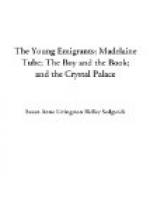Years rolled on, and the mother and son had never met again; when one summer evening of the year 1438, a traveller, who had that morning arrived in the town of Mainz, passed out of it towards the little village of Steinheim. He was weary and way-worn; his clothes soiled and dusty with long travel, and his cheeks tanned from long exposure to the sun. Upon his back he bore a knapsack, and under his arm he carried a large and carefully wrapped packet. As he reached the little hill at the foot of which the village lay, he paused to look around him; and he looked not as one who beholds for the first time a beautiful view, taking in at a glance the whole picture which was spread before him; but seeking out rather each well remembered object that was connected with the past years of youth and childhood. Stretching from the north, and far away to the west, was a long and wavy chain of hills, behind which the sun was setting in a bright blaze of gold and red. How often had the traveller seen such a sunset behind the blue summits of those hills before! Flowing yet nearer to him was the noble river Rhine, winding onward to the north, and bearing on its bosom many a little skiff which scudded quickly before the evening breeze, or raft of timber which floated slowly down its stream. How often had the stranger sailed in such little barks upon its surface, or bathed and fished in its waters! At his feet lay the little cluster of cottages which formed the village of Steinheim; and amid its clustering trees and vineyards, it was not fancy, perhaps, that led the traveller to think that he could distinguish one roof from all the rest, and one patch of vines from out the other larger vineyards. He passed on with quickened steps; but as he approached the cottages, he found—not like the distant mountains or the wide river—that much was new and changed. Houses and cottages had sprung up where fields of barley and flax had grown, and a new church stood where once a barn had been. He sought out the little cottage that once he had known so well. Alas! it was strangely changed. A stone wall supplied the place of the old briar-hedge, and shrubs had grown up into trees, shadowing the door and window, whilst moss and ivy covered the walls and roof. With a trembling hand he knocked at the lowly door. The lattice was opened, and a strange face came to answer his inquiries.
“Does not the Frau Gensfleisch live here?” asked the stranger with a faltering voice.
“The Frau Gensfleisch,” said the woman; “nay, my good friend, the Frau Gensfleisch has left our village this many a day. Maybe she lives now in the town, or maybe she is dead; I cannot tell thee which.”
The traveller turned away.




